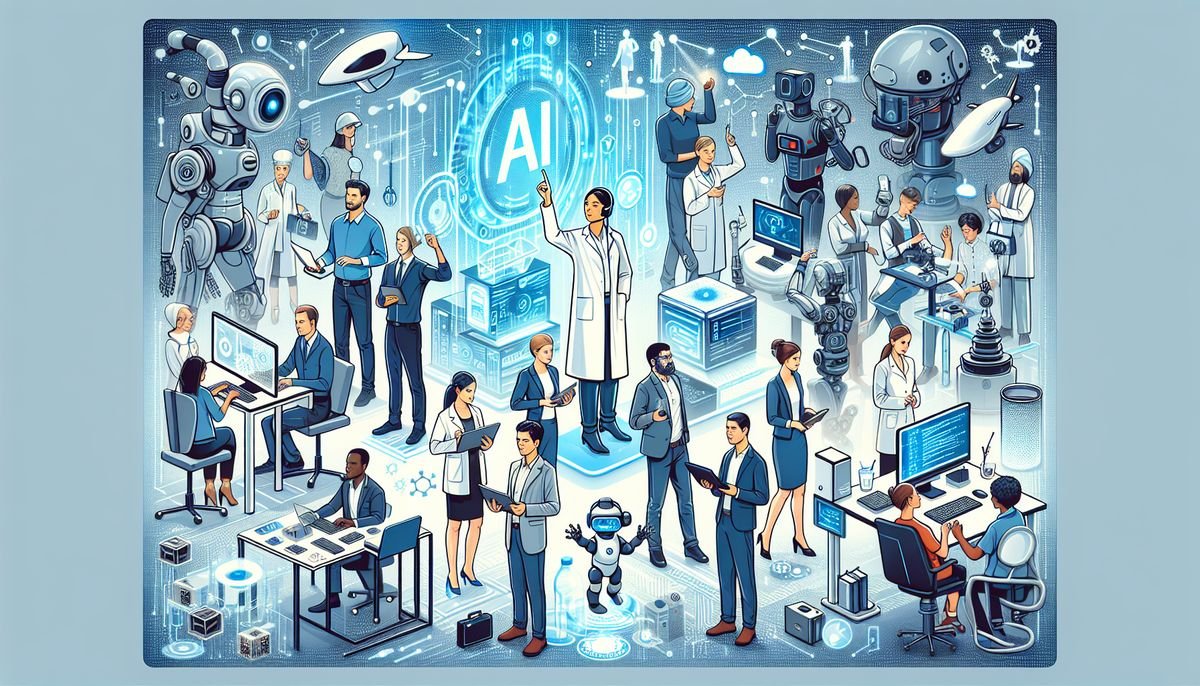The rapid advancement of technology has opened up new doors for innovation in various industries, and finance is no exception. The development of AI has sparked a revolution in financial trading, promising a more efficient and profitable approach to investing. In this article, we will delve into the world of AI trading software, exploring its potential benefits, the opportunities it presents, and how anyone can join the AI financial revolution.
Key Takeaways
- AI-powered software tools are revolutionizing industries by streamlining operations, enhancing logistics, and providing predictive analytics.
- AI is transforming customer experiences through personalization strategies, improved customer engagement, and feedback analysis.
- AI applications in modern business operations offer benefits such as data analysis, adaptive decision-making, and precision forecasting.
- AIaaS trends are reshaping industries by democratizing AI access, advancing machine learning, and offering innovative AI solutions.
- The impact of AI on financial investments is evident in market trend analysis, predictive decision-making, and digital banking transformation.
AI-Powered Software Tools in Supply Chain Management
Streamlining Operations
The integration of AI-powered software tools is transforming supply chain management by automating and optimizing workflows. This technological advancement is particularly evident in the reduction of manual tasks, such as data entry and report generation, leading to increased efficiency and accuracy.
- Streamlining Workflows: AI applications eliminate repetitive tasks, enhancing productivity.
- Predictive Analytics: They enable proactive decision-making by identifying trends.
- Instant Decision-Making: AI facilitates immediate actions, crucial for dynamic environments.
The synergy between AI and supply chain operations fosters a landscape where downtime is minimized, yield rates are improved, and operating costs are reduced.
As businesses continue to embrace AI in supply chain management, they unlock benefits and address challenges that pave the way for future innovations. This ongoing revolution is not just about efficiency; it’s about reshaping the future of business operations.
Enhancing Logistics
The integration of AI-driven solutions in logistics has been a game-changer for supply chain management. Recent trends show a significant shift towards greener transport logistics, with AI tools playing a pivotal role. These intelligent systems optimize transportation routes by accounting for variables such as traffic conditions, road closures, and weather patterns, leading to more efficient and eco-friendly operations.
In the realm of warehouse logistics, AI has been instrumental in automating routine tasks such as inventory management and quality checks. This not only speeds up the process but also reduces the likelihood of human error. Supplier management has also seen improvements, with AI enabling better coordination and communication between different parties in the supply chain.
The synergy between AI and logistics is creating a more resilient and responsive supply chain, capable of adapting to the dynamic demands of the market.
The table below outlines some of the key benefits of AI in logistics:
| Advantage | Description |
|---|---|
| Streamlining Workflows | Eliminates repetitive manual tasks and improves efficiency |
| Personalized Recommendations | Offers targeted suggestions based on user data and behavior |
| Automation | Automates time-consuming tasks, freeing up resources |
| Predictive Analytics | Enables data-driven decision-making and identifies trends |
Predictive Analytics
In the realm of supply chain management, predictive analytics has become a cornerstone for proactive decision-making. The first step in leveraging predictive analytics is collecting, storing, and managing vast supply chain data. This includes sales, inventory, production, and more, which are then analyzed using advanced algorithms and machine learning techniques. By doing so, businesses can extract valuable insights that help in optimizing operations and anticipating future demands.
Predictive analytics empowers businesses to not only respond to current market conditions but also to anticipate and prepare for future changes. It is a strategic asset in maintaining a competitive edge.
Using AI and data analytics for supply chain, companies are now able to forecast market trends with greater accuracy. For instance, recent advancements have enabled the prediction of supply chain disruptions due to unforeseen events, allowing companies to mitigate risks before they escalate. The integration of AI into these systems has been pivotal in enhancing their predictive capabilities, leading to more resilient supply chains.
AI Revolutionizing Customer Experiences
Personalization Strategies
In the dynamic landscape of customer experience (CX), AI-powered personalization is a game-changer. By leveraging user data and behavior, AI tools are now capable of providing highly personalized recommendations within SaaS applications, transforming how users interact with services. These recommendations are not just enhancing user engagement but are also pivotal in driving conversion rates.
Customization in AI services is rapidly evolving, moving away from generic solutions to those that are customizable and industry-specific. This shift is crucial for businesses seeking to align AI technologies with their unique goals and challenges. Moreover, AI’s role in cybersecurity has become increasingly significant, offering real-time threat detection and mitigation while adapting to user preferences to foster loyalty.
The benefits of AI in personalization are manifold:
- Streamlining workflows by eliminating manual tasks, thus improving efficiency
- Offering targeted suggestions based on comprehensive user data and behavior
- Automating time-consuming tasks, which allows for better resource allocation
- Utilizing predictive analytics for data-driven decision-making and trend identification
- Enhancing customer service capabilities while reducing support ticket volumes
- Bolstering cybersecurity measures to protect sensitive data
AI’s predictive capabilities extend into the retail sector, creating a hyper-personalized shopping experience by analyzing purchasing history and browsing habits. This not only tailors the customer journey but also aids in inventory management by forecasting product demand, enabling retailers to optimize their stock levels.
Customer Engagement
The integration of AI into customer engagement strategies has been a game-changer for businesses seeking to deepen relationships with their clients. Generative AI is at the forefront, offering natural conversations and contextual understanding that significantly enhance the user experience. This trend is particularly evident in the realm of customer service, where AI-powered chatbots and virtual assistants are now capable of handling a wide array of customer inquiries, providing instant support, and resolving common issues autonomously.
The benefits of AI in customer engagement are manifold, including:
- Reduced support ticket volumes
- Improved response times
- Personalized user interactions
- Increased customer satisfaction
By leveraging AI, businesses are not only able to offer 24/7 customer service but also gain valuable insights from customer data, which can be used to further refine engagement strategies and drive loyalty.
Recent advancements in AI have also seen the implementation of tools like CallMiner Eureka in call centers, enhancing sales and agent performance monitoring, efficiency, and compliance enforcement. As AI continues to evolve, its impact on customer engagement is expected to grow, offering even more sophisticated and seamless interactions.
Feedback Analysis
The integration of AI in customer feedback analysis is a significant trend that continues to gain momentum. AI tools are now essential in parsing through vast amounts of feedback data, providing actionable insights that drive a data-driven decision-making culture. This trend is particularly evident in the rise of AI-powered survey tools, which are designed to create professional surveys and extract valuable data from the feedback collected.
Recent advancements in AI have led to the development of Edge AI and AI-powered automation, which are now being utilized in services like CallMiner Eureka. These services are employed in call centers to monitor sales performance, efficiency, and customer satisfaction, among other metrics.
- Personalized recommendations
- Automation in feedback collection
- Data-driven decision-making
The role of AI in transforming feedback analysis cannot be overstated. It not only streamlines the collection process but also ensures that every piece of customer feedback is analyzed to improve products and services.
AI Applications in Modern Business Operations
Data Analysis and Insights
In recent months, the integration of Edge AI has become a pivotal trend in enhancing data analysis and insights. Edge AI refers to the deployment of artificial intelligence algorithms on local devices at the ‘edge’ of the network, closer to the source of data. This approach minimizes latency, reduces bandwidth usage, and ensures faster and more reliable data processing.
The benefits of Edge AI in data analysis are numerous, including:
- Streamlining workflows by processing data on-site, thus eliminating the need for constant communication with central servers.
- Providing personalized recommendations in real-time, leveraging data directly from user interactions.
- Enabling predictive analytics that are more immediate and contextually relevant, enhancing decision-making processes.
The convergence of AI and edge computing is not just a technological leap but a catalyst for business innovation, driving efficiency and creating new opportunities.
Macrosoft’s recent initiative to partner data scientists with developers and analysts exemplifies the collaborative efforts to harness AI for more sophisticated data analysis. Their work on the CallMiner product ecosystem demonstrates a commitment to evolving AI applications in business operations.
Adaptive Decision-Making
In the realm of business operations, adaptive AI is emerging as a game-changer, particularly in the context of learning and decision-making. This innovative approach allows machines to not only process vast amounts of data but also to learn from it and adapt their strategies in real-time. The implications for businesses are significant, as adaptive AI can lead to more nuanced and effective decision-making processes.
One of the most notable trends in the past few months has been the integration of adaptive AI in areas that require instant decision-making and action. This has been particularly transformative in environments where rapid responses are crucial, such as in financial trading or emergency services. The ability of AI to learn and adapt in these scenarios is not just a step forward in efficiency; it’s a leap towards a future where AI can handle complex, unpredictable situations with a level of precision and speed unattainable by humans alone.
Adaptive AI represents a significant advancement in the field of AI, enabling machines to learn, adapt, and make decisions in a dynamic and personalized manner.
The following points highlight the impact of adaptive AI on various business operations:
- Automation of complex tasks that require cognitive abilities
- Real-time optimization of supply chains and customer experiences
- Enhanced predictive analytics for data-driven decision-making
The trend towards adaptive AI is not only improving operational efficiency but also opening new avenues for applications in remote and bandwidth-constrained environments, where traditional AI systems may face limitations.
Precision Forecasting
In the dynamic landscape of modern business, AI-powered precision forecasting is becoming an indispensable tool for staying competitive. Over the past few months, the focus has shifted towards customizing AI solutions to fit specific industry needs, enhancing their relevance and efficiency. This trend is particularly evident in sectors like healthcare and finance, where tailored AI services are not just a luxury but a necessity for precise forecasting.
AI forecasting, a process that leverages time series data to predict future developments, is now a critical component in various business strategies. It helps in avoiding issues such as overstock or stockouts, thereby reducing inventory costs and improving supply chain management. The table below illustrates the impact of AI forecasting on inventory management:
| Metric | Before AI | After AI Implementation |
|---|---|---|
| Overstock Rate | High | Significantly Reduced |
| Stockout Incidents | Frequent | Markedly Less Frequent |
| Inventory Costs | Elevated | Noticeably Lowered |
The integration of AI into forecasting models has not only optimized inventory management but also paved the way for adaptive decision-making, where businesses can swiftly respond to market changes and customer demands.
As AI continues to evolve, the ability to forecast with precision is expected to become even more refined, offering businesses a clear advantage in a rapidly changing market.
AIaaS Trends Reshaping Industries
Democratizing AI Access
The democratization of AI is a transformative trend that’s been gaining momentum, particularly with recent initiatives like the National Artificial Intelligence Research Resource pilot in the U.S. This movement aims to bridge the gap between industry heavyweights and academic institutions, fostering an environment where AI tools and resources are more accessible to a broader range of users.
- Collaborative AI ecosystems are emerging, breaking down the silos of AI development.
- Ethical AI frameworks are becoming a priority, ensuring transparency and accountability.
- The AIaaS landscape is evolving with customizable solutions and shared expertise.
The democratization of AI not only accelerates innovation but also introduces a set of benefits and challenges that reshape how businesses understand and apply AI to achieve significant outcomes.
As the AIaaS market continues to expand, it’s clear that the focus isn’t solely on technological advancements but also on establishing a trustworthy relationship between AI service providers and their clients. This trend is crucial for ensuring that AI’s potential is harnessed responsibly, with an emphasis on ethical standards and societal benefits.
Advancements in Machine Learning
Recent advancements in machine learning are propelling AI capabilities to new frontiers, particularly in the realm of natural language processing (NLP) and decision-making. Machines are now able to engage in conversations, interpret human language, and even create images with a level of sophistication that was once the sole domain of human cognition. This leap in machine learning is not just a technical marvel; it’s a transformative force across industries.
One of the most notable trends is the rise of Multimodal AI, which combines different types of data input, such as text, audio, and visual information, to improve decision-making processes. This integration allows AI to deliver more nuanced and context-aware responses, making it an invaluable tool for businesses seeking to enhance their operations.
The convergence of AI and machine learning is creating a synergy that is unlocking new possibilities and redefining the potential of technology.
As we look towards 2024, the landscape of machine learning is brimming with potential, marked by key trends such as Agentic AI, which focuses on autonomous decision-making, and Retrieval-augmented generation, which enhances the ability of AI to generate content by retrieving relevant information from vast datasets.
Innovative AI Solutions
The landscape of AIaaS is witnessing a surge in innovative AI solutions that are transforming industries at an unprecedented pace. One of the most notable trends in the past three months is the integration of Edge AI, which brings the power of artificial intelligence closer to the data source, reducing latency and enhancing real-time decision-making capabilities.
The fusion of AI with edge computing is not just a technological leap; it’s a strategic advantage for businesses operating in real-time environments.
Collaborative AI is another trend that’s gaining momentum. By fostering partnerships and leveraging open-source platforms, businesses are accelerating the pace of AI innovation and application. This collaborative approach is crucial for overcoming traditional barriers to AI adoption and ensuring a diverse and dynamic AIaaS ecosystem.
- Edge AI Integration
- Collaborative AI Ecosystems
- Automation with Cognitive Abilities
These artificial intelligence examples are not only reshaping industries but are also redefining what’s possible in robotics, healthcare, transportation, finance, and more. As we look towards 2024, it’s clear that AI’s transformative impact will continue to grow, driven by these cutting-edge applications.
The Impact of AI on Financial Investments
Market Trend Analysis
In the rapidly evolving financial landscape, AI-powered tools are becoming indispensable for market trend analysis. These tools leverage machine learning algorithms to sift through massive datasets, identifying patterns and insights that can inform investment strategies. As a result, investors are increasingly relying on AI to stay ahead in a competitive market.
One of the most significant trends in the past three months has been the integration of AI in digital banking platforms. This trend is not only about enhancing user experience but also about providing sophisticated tools for market analysis and investment decision-making. Financial institutions are now offering platforms that incorporate AI to analyze market data, predict trends, and offer personalized investment advice.
- Brandwatch Consumer Intelligence
- TalkWalker
- Qlik Sense
- Microsoft Power BI
- Meltwater
- IBM Cognos
These tools represent just a fraction of the AI solutions reshaping the financial investment landscape. They are designed to provide investors with a competitive edge by offering deep insights into market dynamics.
Predictive Decision-Making
In the realm of financial investments, AI’s predictive decision-making capabilities are becoming increasingly indispensable. Recent advancements have seen AI not only forecast market trends but also empower investors with instant decision-making tools. This trend is particularly notable in the context of predictive analytics tools, which have been significantly enhanced with AI, making them more accessible to both data scientists and business users.
AI’s predictive prowess is not limited to market analysis; it extends to customer behavior and sales opportunities, enabling businesses to proactively tailor their strategies. For instance, AI can analyze user data to provide personalized recommendations, a feature that’s becoming a staple in SaaS applications, thereby increasing user engagement and conversion rates.
The integration of AI into predictive analytics represents a leap forward in how businesses approach data. It’s not just about processing information but transforming it into actionable insights that drive strategic decisions and foster a competitive edge.
Digital Banking Transformation
The digital banking transformation is accelerating as we approach 2024, with AI playing a pivotal role in reshaping the financial landscape. Banks are leveraging AI to offer more personalized services, enhancing the customer experience and streamlining operations. This shift is not just about technology; it’s a fundamental change in how financial services are delivered and consumed.
- Streamlining Workflows: AI eliminates repetitive manual tasks, increasing efficiency.
- Personalized Recommendations: Customers receive targeted suggestions based on their data and behavior.
- Automation: Time-consuming tasks are automated, freeing up human resources.
- Predictive Analytics: Data-driven decision-making is enabled, identifying future trends.
- Customer Service: AI enhances support capabilities and reduces ticket volumes.
- Enhanced Cybersecurity: AI systems detect and mitigate threats, ensuring data protection.
- Scalability: AI solutions can grow with the institution, handling increased demand without a linear increase in costs.
The integration of AI into digital banking is not just a trend; it’s a strategic imperative that is setting the stage for the future of finance. Institutions that embrace this transformation are poised to lead the market, offering unparalleled convenience and security to their customers.
AI Transforming Manufacturing Processes
Automated Production Lines
The integration of AI into automated production lines is transforming the landscape of manufacturing. AI-POWERED AUTOMATION is not just enhancing efficiency; it’s redefining the capabilities of production systems. In the realm of food manufacturing, companies like TDI Packsys are at the forefront, offering solutions that streamline processes and boost productivity.
One of the most significant impacts of AI in this domain is the reduction of unplanned downtime. A recent survey highlighted the staggering cost of such interruptions, with manufacturers incurring an average loss of $260,000 per hour. By employing predictive maintenance, AI systems can analyze production data to foresee and mitigate potential failures, leading to higher yield rates and lower operating costs.
The future of manufacturing is one where AI-driven optimization pervades every step of the workflow, leading to unprecedented levels of productivity and efficiency.
The trend towards AI automation extends beyond routine tasks, now encompassing complex cognitive functions such as decision-making and problem-solving. This evolution is not only streamlining workflows but also opening up new possibilities for innovation within the industry.
Quality Control Enhancements
The integration of AI in quality control has been a game-changer for manufacturing processes, particularly in the realm of defect detection. By leveraging AI and machine vision, manufacturers are now able to identify imperfections with unprecedented speed and accuracy. This not only assures better product quality but also significantly reduces the time taken to bring products to market.
The implementation of AI for quality assurance is not without its challenges. It requires a thoughtful approach to integrate seamlessly with existing processes and to train personnel accordingly. However, the benefits are clear: a marked improvement in product quality and process efficiency.
Recent trends show a growing adoption of AI-driven quality control systems, which are becoming more sophisticated and accessible. Here’s a brief overview of the impact:
-
Faster defect detection: AI systems can analyze images and data at a rate far beyond human capabilities.
-
Continuous improvement: Machine learning algorithms can learn from past inspections, continually enhancing their accuracy.
-
Reduced downtime: With quicker identification of issues, production lines experience less interruption.
-
Data-driven insights: AI provides valuable feedback that can be used to refine manufacturing processes.
Supply Chain Optimization
The integration of AI-driven supply chain optimization software is a pivotal advancement in the manufacturing industry. By leveraging AI, businesses are now able to forecast demand with unprecedented accuracy, which is crucial for maintaining balanced inventory levels. This not only mitigates risks associated with inventory imbalances but also aligns with manufacturing velocity to optimize inventory levels effectively.
The synergy between AI and supply chain management has led to significant improvements in operational efficiency. This includes reducing downtime, increasing yield rates, and lowering operating costs, ultimately paving the way for a future where AI drives optimization across every step of the manufacturing workflow.
Recent trends show a growing adoption of AI in optimizing supply chains, particularly in the following areas:
- Forecasting assembly-line asset demand: AI algorithms analyze historical data and predict future needs to ensure that the right resources are available when needed.
- Inventory management: Smart systems determine the optimal stock levels based on various factors, including production schedules, lead times, and market demand.
- Mitigating risks: By anticipating potential disruptions, AI helps companies to proactively adjust their strategies, thereby reducing the impact of unforeseen events.
Conclusion
In conclusion, the integration of AI in software tools is revolutionizing industries at an unprecedented pace. From streamlining processes to enhancing user experiences, the impact of AI-powered automation and predictive analytics is reshaping the future of software delivery. Businesses that embrace AI in SaaS applications are poised to stay ahead of the curve, offering personalized solutions that drive innovation and improve customer satisfaction. As we navigate through this era of technological advancement, the role of AI in shaping the digital landscape cannot be overstated. The future of industries lies in the hands of AI-powered software tools, paving the way for a new era of efficiency and innovation.
Frequently Asked Questions
How are AI-powered software tools revolutionizing industries?
AI-powered software tools are revolutionizing industries by streamlining operations, enhancing logistics, providing predictive analytics, personalizing customer experiences, improving customer engagement, enabling feedback analysis, analyzing data for insights, supporting adaptive decision-making, offering precision forecasting, democratizing AI access, advancing machine learning, reshaping industries with innovative solutions, impacting financial investments through market trend analysis, predictive decision-making, and digital banking transformation, and transforming manufacturing processes with automated production lines, quality control enhancements, and supply chain optimization.
What are the key benefits of AI-powered software tools in supply chain management?
The key benefits of AI-powered software tools in supply chain management include streamlining operations for efficiency, enhancing logistics for better coordination, and providing predictive analytics for informed decision-making.
How does AI revolutionize customer experiences?
AI revolutionizes customer experiences by enabling personalization strategies for tailored interactions, enhancing customer engagement for improved relationships, and analyzing feedback to understand and address customer needs effectively.
What are some common AI applications in modern business operations?
Common AI applications in modern business operations include data analysis and insights for informed decision-making, adaptive decision-making for flexibility, and precision forecasting for accurate planning.
What are the trends in AIaaS reshaping industries?
The trends in AIaaS reshaping industries include democratizing AI access for broader utilization, advancements in machine learning for enhanced capabilities, and innovative AI solutions for transformative impact.
How does AI impact financial investments?
AI impacts financial investments by analyzing market trends for informed decisions, supporting predictive decision-making for better outcomes, and driving digital banking transformation for improved services.
In what ways is AI transforming manufacturing processes?
AI is transforming manufacturing processes by implementing automated production lines for efficiency, enhancing quality control measures for consistency, and optimizing supply chains for improved logistics.
Why is embracing AI essential for business leaders?
Embracing AI is essential for business leaders as it fuels success in the tech-driven landscape, shapes the future of operations, enhances how we live and work, and revolutionizes industries for long-term growth.



